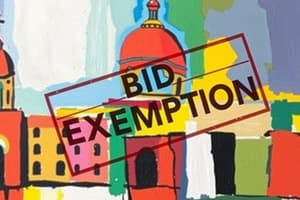Podcast
Questions and Answers
In project procurement management, what differentiates the execution phase from the planning phase?
In project procurement management, what differentiates the execution phase from the planning phase?
- Moving from active management and delivery to planning.
- Limiting stakeholder involvement.
- Transitioning procurement plans into tangible realities. (correct)
- Focusing solely on awarding contracts.
What is the most important role of a robust procurement process for a business?
What is the most important role of a robust procurement process for a business?
- Guaranteeing financial efficiency by optimizing costs and timelines. (correct)
- Boosting advertisement strategies.
- Allowing the use of lowest-quality goods and services to maximize profits.
- Decreasing the range of suppliers to ensure consistency.
When executing procurement, how does 'Conduct Procurement' primarily benefit a project?
When executing procurement, how does 'Conduct Procurement' primarily benefit a project?
- It aligns internal and external stakeholder expectations through established agreements. (correct)
- It makes sure the project manager has total authority.
- It helps avoid taxes.
- It guarantees the selection of the lowest-priced seller, disregarding other factors.
During procurement execution, what is the primary goal of contract administration?
During procurement execution, what is the primary goal of contract administration?
What is the significance of compliance in contract management?
What is the significance of compliance in contract management?
How does effective Supplier Relationship Management (SRM) specifically contribute to project success?
How does effective Supplier Relationship Management (SRM) specifically contribute to project success?
In Supplier Relationship Management (SRM), what is the purpose of maintaining clear and consistent communication?
In Supplier Relationship Management (SRM), what is the purpose of maintaining clear and consistent communication?
Why is it important to identify and document all changes in complex projects?
Why is it important to identify and document all changes in complex projects?
What is the FIRST step in a formal change control process?
What is the FIRST step in a formal change control process?
What is the significance of developing contingency plans in practical risk management?
What is the significance of developing contingency plans in practical risk management?
What is the key reason for monitoring supplier performance during procurement execution?
What is the key reason for monitoring supplier performance during procurement execution?
Why should project teams maintain accurate and complete records of all procurement activities?
Why should project teams maintain accurate and complete records of all procurement activities?
How can technology improve procurement processes?
How can technology improve procurement processes?
What is the role of procurement governance and ethics in the procurement process?
What is the role of procurement governance and ethics in the procurement process?
What is the practical result of logistics and supply chain coordination?
What is the practical result of logistics and supply chain coordination?
A company that requires a specific kind of equipment or service should complete which of the seven key steps of a procurement process?
A company that requires a specific kind of equipment or service should complete which of the seven key steps of a procurement process?
What is the key objective of procurement management during the execution phase?
What is the key objective of procurement management during the execution phase?
Which of the following is NOT a key activity in managing procurement during the execution phase?
Which of the following is NOT a key activity in managing procurement during the execution phase?
Which tool is commonly used to track supplier performance in the execution phase?
Which tool is commonly used to track supplier performance in the execution phase?
If a vendor fails to deliver on time, what should be the FIRST step?
If a vendor fails to deliver on time, what should be the FIRST step?
A supplier has delivered equipment for a project, but upon inspection, the quality does not meet the agreed standards. The supplier insists that it meets industry standards, but your team disagrees. What steps should you take FIRST?
A supplier has delivered equipment for a project, but upon inspection, the quality does not meet the agreed standards. The supplier insists that it meets industry standards, but your team disagrees. What steps should you take FIRST?
Which of the following is the MOST important aspect of ensuring project integrity in procurement execution?
Which of the following is the MOST important aspect of ensuring project integrity in procurement execution?
How does building and maintaining strong supplier relationships support long-term value in procurement execution?
How does building and maintaining strong supplier relationships support long-term value in procurement execution?
What is the primary benefit of implementing whistleblower mechanisms in procurement governance?
What is the primary benefit of implementing whistleblower mechanisms in procurement governance?
A construction firm mitigates steel price fluctuations by securing long-term agreements. Which procurement activity is this an example of?
A construction firm mitigates steel price fluctuations by securing long-term agreements. Which procurement activity is this an example of?
Flashcards
Execution Phase
Execution Phase
Where procurement plans become reality, ensure project success through effective procurement management, moving from planning and awarding contracts to active management and delivery.
Conduct Procurement
Conduct Procurement
Obtaining seller responses, selecting a seller, and awarding a contract. Provides alignment of internal and external stakeholder expectations through agreements.
Objectives: Procurement Execution
Objectives: Procurement Execution
Ensuring timely delivery of goods and services while staying within budget, maintaining quality, fulfilling contractual obligations, and building strong supplier relationships.
Contract Administration
Contract Administration
Signup and view all the flashcards
Compliance
Compliance
Signup and view all the flashcards
Supplier Relationship Management
Supplier Relationship Management
Signup and view all the flashcards
SRM Communication
SRM Communication
Signup and view all the flashcards
Identify changes
Identify changes
Signup and view all the flashcards
Change Control Process
Change Control Process
Signup and view all the flashcards
Risk Management
Risk Management
Signup and view all the flashcards
Supplier Performance Monitoring
Supplier Performance Monitoring
Signup and view all the flashcards
Documentation & Communication
Documentation & Communication
Signup and view all the flashcards
Technology for procurement
Technology for procurement
Signup and view all the flashcards
Procurement Governance & Ethics
Procurement Governance & Ethics
Signup and view all the flashcards
Logistics/Supply Chain Coordination
Logistics/Supply Chain Coordination
Signup and view all the flashcards
Procurement Challenges & Solutions
Procurement Challenges & Solutions
Signup and view all the flashcards
Execution Phase
Execution Phase
Signup and view all the flashcards
Procurement Process
Procurement Process
Signup and view all the flashcards
Conduct Procurement
Conduct Procurement
Signup and view all the flashcards
Objectives of Procurement Execution
Objectives of Procurement Execution
Signup and view all the flashcards
Contract administration
Contract administration
Signup and view all the flashcards
Contract Management
Contract Management
Signup and view all the flashcards
SRM- Importantce
SRM- Importantce
Signup and view all the flashcards
Change Management
Change Management
Signup and view all the flashcards
Practical Risk Management
Practical Risk Management
Signup and view all the flashcards
Study Notes
Managing Procurement: Execution
- The execution phase turns procurement plans into reality
- This phase is critical for ensuring project success
- Moves from planning and awarding contracts to active management and delivery
Importance of a Strong Procurement Process
- Ensures financial efficiency by securing the right prices
- Minimizes delivery times
Key Steps of a Procurement Process
- Identify goods or services needed
- Consider a list of suppliers
- Negotiate contract terms with the selected supplier
- Finalize the purchase order
- Receive the invoice and process payment
- Ensure the delivery and audit of the order
- Maintain accurate records of invoices
Conduct Procurement Process
- Involves obtaining seller responses, selecting a seller, and awarding a contract
- Aligns internal and external stakeholder expectations through agreements
Inputs for Conduct Procurement
- Procurement management plan and documents
- Source selection criteria and seller proposals
- Project documents and make-or-buy decisions
- Procurement statement of work
- Organizational process assets
Tools & Techniques for Conduct Procurement
- Bidder conferences and proposal evaluation techniques
- Independent estimates and expert judgment
- Advertising and analytical techniques
- Procurement negotiations
Outputs of Conduct Procurement
- Selected sellers and agreements established
- Resource calendars and change requests for adjustments
- Project management plan updates and project document updates
Key Objectives of Procurement Execution
- Timely delivery of goods and services is crucial
- Maintaining strict quality standards is essential, staying within the allocated budget
- Fulfilling all contractual obligations ensures project integrity
- Building and maintaining strong supplier relationships is important for long-term value
Contract Administration: The Core of Execution
- Ensures smooth execution and compliance
- Involves tracking deliverables and milestones
- Managing payment schedules and invoices
- Handling formal correspondence
- Maintaining comprehensive contract documentation
Contract Management (Compliance)
- Compliance is vital to avoid legal and operational issues
- Legal and regulatory requirements must be followed
- Specified quality standards must be maintained
- Environmental and safety regulations must be adhered to
Supplier Relationship Management (SRM) - Importance
- Strong supplier relationships are a strategic asset
- Effective SRM leads to improved communication and transparency
- It will also enhance collaboration and problem-solving
- Reduce risks and conflicts; increase value and innovation
SRM - Communication and Collaboration
- Clear and consistent communication is key
- Strategies include regular status meetings and updates
- Prompt and accurate information sharing is important
- Establishing clear communication protocols
- Improve collaborative problem-solving
Change Management (Identifying Changes)
- Changes are inevitable in complex projects
- Identify and document all changes to contracts, agreements, project requirements, and specifications
- Examples of changes include scope changes, schedule adjustments, and specification modifications
Change Management (Change Control Process)
- Establish a formal change control process
- Formal change requests must be submitted
- Thorough impact assessments should be conducted
- A formal approval process must happen
- Communicate approved changes clearly
Practical Risk Management During Execution
- Identify and mitigate risks such as impact delivery, quality, or cost
- Develop contingency plans for potential disruptions
- Monitor supplier performance and financial stability
Supplier Performance Monitoring
- Use Key Performance Indicators (KPIs) for supplier evaluation
- Conduct regular reporting and audits
- Manage supplier relationships and communication
- Administer corrective actions for underperformance
Best Practices in Documentation and Communication
- Maintain accurate and complete records of all procurement activities
- Establish clear communication channels and protocols
- Use tools and technologies to streamline both documentation and communication
Technology in Procurement Execution
- Leverage technology to enhance efficiency
- Use procurement software and e-sourcing tools, e-invoicing, and payment systems and supplier portals
Procurement Governance and Ethics
- Prevents corruption and favoritism
- Establishes transparency in supplier selection
- Implements whistleblower mechanisms for reporting misconduct
Logistics and Supply Chain Coordination
- Manages transportation, warehousing, and inventory control
- Ensures timely delivery of goods
- Reduces logistics bottlenecks
Procurement Challenges and Solutions
- Identifies common problems such as supplier failures and budget overruns
- Provides real-world solutions for overcoming procurement challenges
Key activity in managing procurement during the execution phase
- Selecting vendors is NOT a key activity
Main objective of procurement management during the execution phase
- Ensuring timely delivery and contract compliance
Tool used to track supplier performance in the execution phase
- Supplier Performance Scorecard
First step if a vendor fails to deliver on time
- Assess the cause and discuss solutions with the vendor
Studying That Suits You
Use AI to generate personalized quizzes and flashcards to suit your learning preferences.




